- Introduction
- Key IT Development Services for Business Growth
- White label Development
- No-Code Development
- Low code Development
- E-Commerce App
- Mobile App Development
- Native App Development
- Cross Platform App Development
- Hybrid App Development
- Web App Development
- Static Web App
- Dynamic Web App
- Cloud App Development
- Cloud-Native App Development
- Cloud-Based App Development
- Conclusion
Is Your Business Ready for Custom Software Development Service?
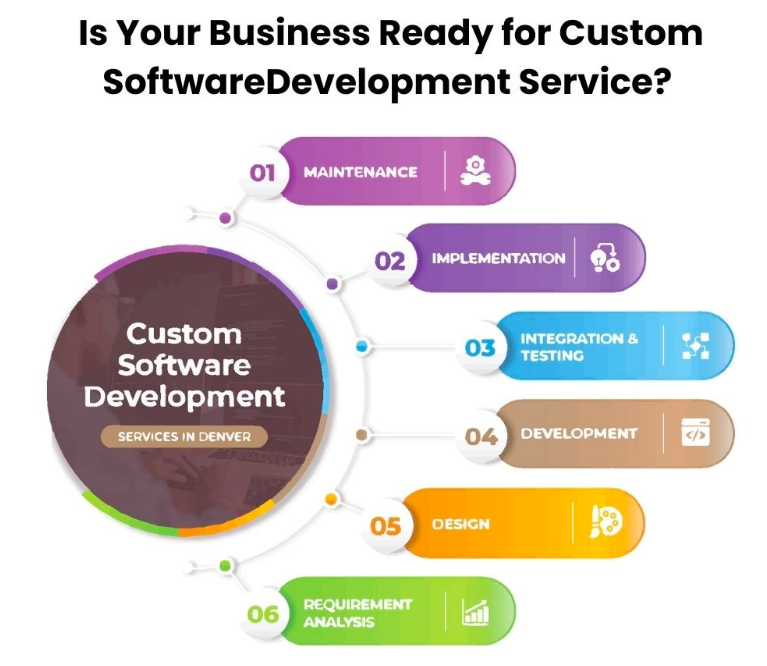
Introduction
In today’s fast-paced, technology-driven world, software solutions are the backbone of business success. They help companies streamline operations, boost efficiency, and elevate customer experiences. From web and mobile app development to cloud app development and custom software, a software development company provides essential services to power digital transformation.
According to Grand View research, the global software market was valued at an impressive $583.47 billion in 2022 and is projected to grow at a CAGR of 11.5% from 2023 to 2030. This booming growth highlights the need for businesses to stay ahead by adopting cutting-edge technologies. In this blog, we’ll explore the key software development services that can drive your business forward and help you thrive in this digital age.
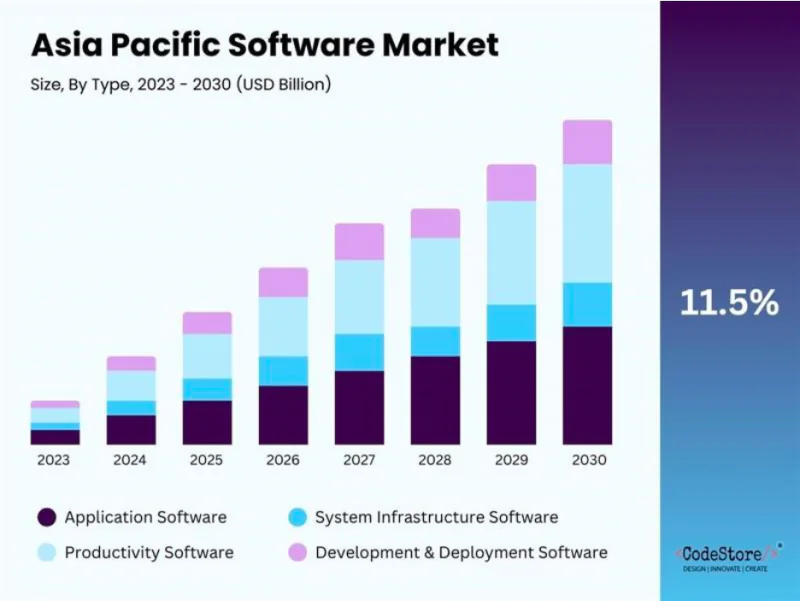
Key IT Development Services for Business Growth
White label Development
White-label development involves creating software products that other businesses can rebrand and sell as their own. This approach saves time and resources by providing pre-built Developed solutions that can be customized with a company’s branding. A basic white-label app for a single platform (iOS or Android) typically costs between $15,000 and $35,000, while multi-platform apps with additional features can exceed $60,000. Post-launch, ongoing maintenance, updates, and added functionalities may further increase costs.
However, the initial software architecture does limit the business further when they try to customize the software as per their specific needs. The dependency on the third-party service providers for the update and support leads to a loss of control over the software, causes delays, and raises the concern of data security regarding data management and data protection. These challenges require businesses to consider custom software development. It offers flexibility, control, and security and can scale itself as a business’s goals change over time.
No-Code Development
No-code app development empowers businesses to build apps without writing complex code by using intuitive visual interfaces and pre-designed components. It is a great choice for small to mid-sized companies, startups, or teams without technical expertise who need quick and affordable solutions. No-code platforms operate on a subscription basis, with costs per month depending on features, app size, and hosting needs.
For instance, platforms like Bubble.io offer pricing tiers for different levels of app usage and hosting. As your app scales, hosting costs may increase with traffic. Even while no-code makes app creation easier, business still needs to make a budget for regular maintenance, updates, and bug fixes. No-code platforms are great for rapid launching apps, but long-term expenses must be considered as business looks to grow and evolve.
Low code Development
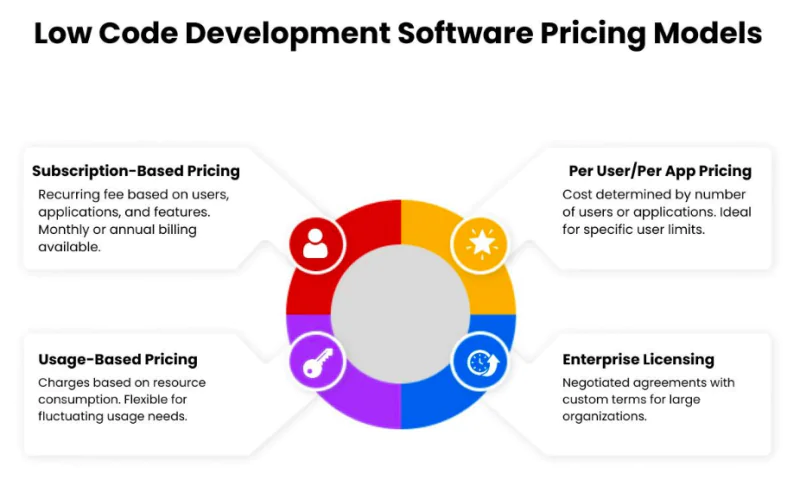
Low-code development is a software development process that enables businesses to build applications quickly using minimal manual coding. With visual interfaces, drag-and-drop tools, and pre-built modules, app developers can create applications faster and more efficiently compared to traditional coding methods. By 2024, 80% of non-IT professionals are expected to develop IT products and services, with over 65% of the professionals using low-code/no-code tools. Businesses can expect the pricing a one-time setup fee and a recurring subscription fee which can range from $10,000 to several hundred thousand dollars or more. Here are some popular pricing models for low-code development platforms:
- Subscription-Based Pricing: Involves paying a recurring fee, either monthly or annually, with the cost determined by factors such as the number of users, applications, and platform features.
- Per User/Per App Pricing: Pricing is based on the number of users or applications created, making it ideal for organizations with specific user limits or a focus on limited app development.
- Usage-Based Pricing: Charges are based on resource consumption like computer power, storage, or data transfer, offering flexibility to organizations with fluctuating usage needs.
- Enterprise Licensing: Large enterprises negotiate tailored licensing agreements that may include fixed fees, usage-based pricing, or a mix of models to meet their unique needs.
E-Commerce App
E-commerce apps, which allow businesses to sell products and services online, are now often developed using low-code platforms. These platforms enable faster, easier app creation with minimal coding, helping businesses launch online stores efficiently. In 2023, eCommerce made up 19.5% of global retail sales, with forecasts predicting nearly a quarter of global retail sales will come from online platforms by 2027.
For example, Shopify provides low-code app development platform for creating customizable e-commerce solutions. These apps manage orders, payments, and shipping, providing seamless digital shopping experiences.
Nowadays, Businesses are considering shifting to custom software development from low-code solutions when they require enhanced functionality, greater security, or a more tailored user experience. If your application needs extensive customization to align with specific business processes or to integrate seamlessly with existing systems, custom development is the best choice. Additionally, as your user base grows, so do your needs, and custom solutions can scale more effectively to accommodate this growth.Custom Software Development
Custom software development is transforming the business landscape, with over 85% of companies adopting tailored solutions to enhance efficiency and streamline operations. As per Grand View Research, the global market for custom software development is set to reach $43.16 billion in 2024 and soar to $146.18 billion by 2030, driven by a 22.5% compound annual growth rate (CAGR).
The benefits of custom software development are substantial. The custom software is designed specifically to meet the unique needs of a business while ensuring optimal scalability, reliability, and integration with existing systems. High-quality development guarantees that the software evolves with the business and serves as a long-term asset for growth and increased revenue.
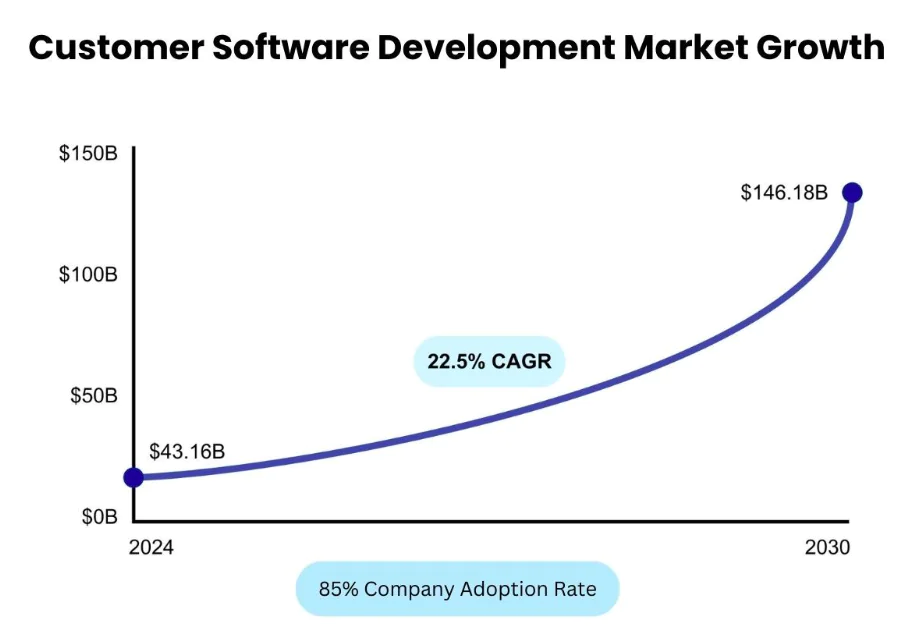
Custom software is particularly valuable for large to medium enterprises, startups with specific challenges, and sectors like healthcare and finance, which require specialized functionalities. While the cost typically ranges from $30,000 to $200,000 or more, this investment is often justified by the competitive advantages and deeper integrations it offers. Ultimately, custom software development empowers businesses to thrive in a dynamic digital market and makes it a strategic necessity for continued success.
Let’s discuss the key software development services that can be aligned to meet the specific needs of your business to drive efficiency, innovation, and growth.
Mobile App Development
Mobile app development involves creating software applications for mobile devices like smartphones and tablets, primarily for platforms like iOS and Android. The demand for mobile apps has surged, with consumers downloading 121 billion apps from the Google Play Store and 35 billion from the App Store in 2023, according to Statista. This number is expected to grow, reaching 143 billion and 111 billion downloads, respectively, by 2026.
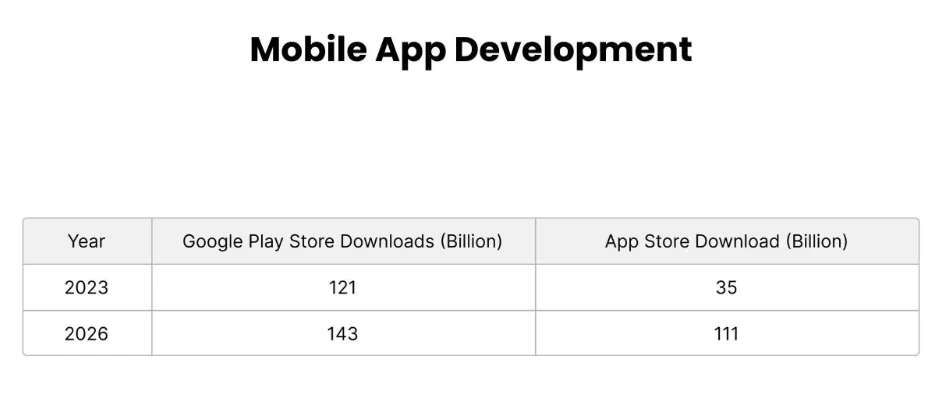
Additionally, the total revenue from mobile apps is expected to hit $673.8 billion by 2027, which makes the mobile app development market booming. Mobile app development can range from $5,000 to $150,000, with complex custom apps exceeding $300,000. The development costs vary based on factors such as app complexity, features, and development approach.
Native App Development
Native app development creates apps tailored for a specific platform, like iOS or Android to deliver superior performance by utilizing platform-optimized features. These apps integrate seamlessly with device hardware, such as GPS and cameras. In Q2 2024, Google Play grossed $11.2 billion, while the Apple App Store generated $24.6 billion in revenue that shows strong growth in consumer spending.
- WhatsApp: It is a fantastic example of a native app designed specifically for iOS and Android. It takes full advantage of each operating system’s capabilities. WhatsApp ensures seamless performance and optimized use of device features like the camera, contacts, and notifications.
Cross Platform App Development
Cross-platform development aims to create apps that work across multiple platforms using a single codebase. Frameworks like React Native or Flutter allow developers to write code once and deploy it on both iOS and Android. While cross-platform apps are more cost-effective than native apps, they offer better performance than hybrid apps.
- Instagram: It is developed using React Native. It is one of the best examples of a cross-platform app. With a single codebase for both iOS and Android, it ensures a smooth, consistent user experience across devices. This approach allows Instagram to deliver fast performance, beautiful design, and seamless functionality for millions of users worldwide
Hybrid App Development
Hybrid applications are created by combining web technologies such as HTML, CSS, and JavaScript with a native container. These applications are developed using a single codebase, which saves money and development time, and they function on several platforms (Android, iOS). Hybrid applications are easier to manage, but they may not provide the same level of performance and user experience as native apps, particularly for complex functionality.
- Amazon App Store: It is a top-performing hybrid app. It blends HTML5 and web technologies to create a sleek and user-friendly interface. It smartly integrates native code to access key device features like the camera and push notifications and delivers a seamless shopping experience that’s both powerful and intuitive across devices.
Mobile apps can also be customized to meet specific business needs that offer tailored solutions that align with unique business goals and requirements. Whether it’s through native, cross-platform, or hybrid app development, businesses can create apps that integrate seamlessly with their operations to enhance user experience and drive engagement. Custom mobile apps provide greater flexibility, scalability, and control and enable businesses to deliver personalized features and functionalities that align with their target audience, that will lead to better customer satisfaction and business growth.
Web App Development
Web app development focuses on creating applications that users access through web browsers to eliminate the need for installation. These apps are scalable, responsive, and accessible from any device with internet access and provide businesses with engaging and interactive solutions. On average, web app development costs between $12,000 and $150,000. As of 2024, there are 2 billion websites online, but only 200 million get actively maintained. Notably, 77.77% of India’s web traffic comes from mobile devices and this highlights the importance of mobile-friendly websites.
Static Web App
Static web applications display fixed content that doesn’t change unless manually updated. They are built using HTML, CSS, and sometimes JavaScript. Since these apps don’t rely on databases, they are faster and more affordable to develop. Static apps are ideal for businesses that need a simple and informational website with minimal user interaction.
- Examples: brochures, landing pages, or portfolios.
Dynamic Web App
Dynamic web app development focuses on creating websites that offer interactive and real-time content. These apps pull data from databases to display updated information instantly. Using technologies like PHP, ASP.NET, or Node.js, dynamic web apps are ideal for blogs, CMS platforms, and portals where frequent updates and user interactions are key. Dynamic apps keep content fresh, engaging, and responsive to user needs.
- Facebook: It is a dynamic web app that grows on real-time user interactions. From sharing posts to real-time discussions, Facebook’s dynamic nature keeps content interactive and customized and keeps adapting seamlessly to individual preferences and privacy settings.
Web apps can also be customized to meet specific business needs. They can offer tailored solutions that enhance functionality and user experience. Depending on business goals, custom web apps can take the form of static or dynamic web apps, content management systems (CMS), portals, or single-page applications (SPAs). Each type can be customized to handle unique requirements, from complex databases to real-time updates and secure transactions that empower businesses to create engaging, scalable, and efficient web experiences for their users.
Cloud App Development
Cloud application development leverages cloud computing for storage, processing, and management to make apps accessible from any device with internet connectivity. It enhances scalability, reduces infrastructure costs, and supports rapid deployment. The global cloud applications market, valued at $133.6 billion in 2021, is expected to reach $168.6 billion by 2025, with a 4.8% growth rate. Development costs range from $5000 to $500,000 and it can vary depending on factors like app complexity, features, security requirements, integrations, and the development team’s expertise.
Cloud-Native App Development
Cloud-native development focuses on building apps specifically for cloud servers using platforms like AWS, Azure, and GCP. These scalable and resilient apps feature smaller and reusable components for quick deployment and continuous innovation. With 30% of companies already adopting cloud-native, 37% intend to be cloud-native in about three years, the future is bright for businesses embracing this transformative approach.
Cloud-Based App Development
Cloud-based application development is somewhat a balanced approach to cloud-native solutions. This involves moving your application from a local server to platforms like AWS or Azure to enhance scalability and availability of software without a complete redesign. This approach streamlines resource management, eliminates server maintenance, and offers a pay-as-you-go model. According to Stats, cloud-based app expenditures are set to rise from 57.7% in 2022 to 65.9% by 2025. On average, employees are using 36 cloud-based services daily that empower them to innovate and thrive in today’s fast-paced digital landscape.
- Netflix: Netflix is both a cloud-based and cloud-native app. By leveraging cloud computing services, it delivers high-quality streaming globally while ensuring scalability and availability. As it is built on microservices, a cloud architecture, it rapidly deploys new features, adapts to user demands, and manages massive data loads efficiently to enhance user experience.
Cloud apps can be customized based on the specific needs of a business by choosing the right cloud deployment model: Infrastructure as a Service (IaaS), Software as a Service (SaaS), or Platform as a Service (PaaS). Additionally, businesses can decide whether their app should be built exclusively on cloud servers or if certain aspects should remain on-premises. This flexibility allows businesses to scale, optimize costs, and enhance security while ensuring the app meets their operational and technical requirements for a seamless cloud experience.
Conclusion
In conclusion, choosing the right software development service can be a game-changer for your business. Whether you need enterprise software solutions, mobile app Development, or cloud-based solutions, embracing modern technology and getting it customized according to your unique goals is key to staying ahead to drive growth, and unlocking new possibilities for success.
If you are one of the businesses looking for top-notch custom software development services that are built for quality, scalability, and affordability? CodeStore is here to help! At Codestore, we specialize in developing custom software solutions tailored to your business needs. Whether you are a startup or a large enterprise, we’re committed to driving your growth with cutting-edge software. You can get in touch with us today to build the best custom software solutions for your business.
